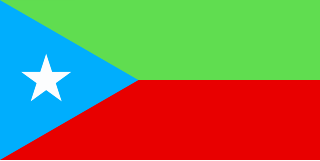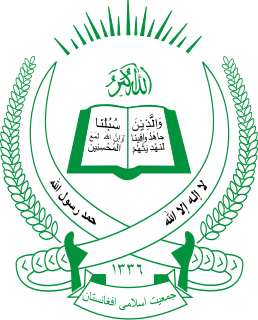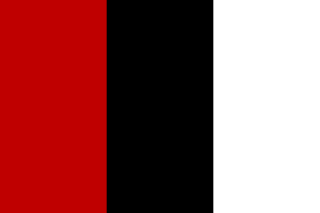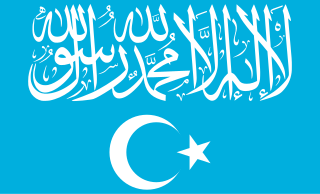 W
WAfghanistan Liberation Organization is a Maoist political group in Afghanistan. It was founded by Dr. Faiz Ahmad and some others in 1973. ALO is one of several organizations that grew out of the Sholaye Javid movement. ALO was originally named Revolutionary Group of the Peoples of Afghanistan ; it was renamed in 1980.
 W
WAfghanistan Mujahedin Freedom Fighters Front was a united front of four Afghan paramilitary factions, formed on the initiative of Maoist groups, including the Revolutionary Group of the Peoples of Afghanistan and the Liberation Organization of the People of Afghanistan (SAMA)—together with moderate Islamists including the Islamic Movement of Afghanistan, in June 1979. They set aside their ideological differences in the fight against a common enemy. The Front fought against the pro-Soviet government and later also the Soviet Army during the Soviet–Afghan War.
 W
WThe Balochistan Liberation Army, also known as the Baloch Liberation Army, is a militant organization based in Afghanistan. The BLA is listed as a terrorist organization by Pakistan, the United Kingdom and the United States. Since 2004, the BLA has waged a violent armed struggle against Pakistan for what it claims as self-determination for the Baloch people and separation of Balochistan from Pakistan and has been involved in ethnic-cleansing of non-Baloch minorities in Balochistan. The BLA is operating mainly in Balochistan, the largest province of Pakistan where it carries out attacks against the Pakistan Armed Forces, civilians and foreign nationals. The Baloch Liberation Army became publicly known during the summer of 2000, after it claimed credit for a series of bombing attacks on Pakistani authorities.
 W
WThe Communist (Maoist) Party of Afghanistan previously known as Communist Party of Afghanistan is an underground Maoist political party in Afghanistan. The party was founded in 2004 through the merger of five Marxist–Leninist–Maoist (MLM) parties. It was a member of the international Revolutionary Internationalist Movement (RIM).
 W
WThe Sacrifice Front, more commonly known as Fidai Mahaz, is a Taliban splinter group and faction in the War in Afghanistan. They are led by Mullah Najibullah, also known as Omar Khitab, a former Taliban commander.
 W
WHezb-e Islami Khalis is an Afghan political movement under Maulawi Khalis, who separated from Gulbuddin Hekmatyar's Hezb-e Islami and formed his own resistance group in 1979. The two parties were distinguished as Hezb-e Islami Gulbuddin and Hezb-e Islami Khalis, after the names of their respective leaders.
 W
WHezb-e Wahdat-e Islami Afghanistan, shortened to Hezb-e Wahdat, was founded in 1989. Like most contemporary major political parties in Afghanistan, Hezb-e Wahdat is rooted in the turbulent period of the anti-Soviet resistance movements in Afghanistan in the 1980s. It was formed to bring together nine separate and mostly inimical military and ideological groups into a single entity. During the period of the Afghan civil war in the early 1990s, it emerged as one of the major actors in Kabul and some other parts of the country. Political Islamism was the ideology of most of its key leaders but the party gradually tilted towards its Hazara ethnic support base and became the key vehicle of the community's political demands and aspirations. Its ideological background and ethnic support base has continuously shaped its character and political agenda. Through the anti-Soviet jihad and the civil war, Hezb-e Wahdat accumulated significant political capital among Afghanistan's Hazaras.
 W
WHezb-e-Islami, meaning Islamic Party is an Islamist organization that was commonly known for fighting the Communist Government of Afghanistan and their close ally the Soviet Union. Founded and led by Gulbuddin Hekmatyar, it was established in Afghanistan in 1975. It grew out of the Muslim Youth organization, an Islamist organization founded in Kabul by students and teachers at Kabul University in 1969 to combat communism in Afghanistan. Its membership was drawn from ethnic Pashtuns, and its ideology from the Muslim Brotherhood and Abul Ala Maududi's Jamaat-e-Islami. Another source describes it as having splintered away from Burhanuddin Rabbani's original Islamist party, Jamiat-e Islami, in 1976, after Hekmatyar found that group too moderate and willing to compromise with others.
 W
WThe Islamic Dawah Organization of Afghanistan is a political party in Afghanistan led by Abdul Rasul Sayyaf. Founded in the early 1980s as the Islamic Union for the Liberation of Afghanistan, it was originally an attempt to bring unity amongst Islamist opposition forces in Afghanistan. However, the creation of the new umbrella organization effectively created a split and the organization became a political party of its own. The organization was part of the 'Peshawar Seven', the coalition of mujahedin forces supported by the United States, Pakistan and various Arab states of the Persian Gulf in the war against the PDPA government and Soviet forces. Through the financial aid received from Saudi sources, the organization was able to attract a considerable military following. Arab volunteers fought in the militia forces of the organisation.
 W
WIslamic Movement of Afghanistan is a political party and former faction of the Afghan Northern Alliance in Afghanistan. The movement is registered as a political party with the Ministry of Justice. From its foundation to 2005, the movement was led by Ayatollah Muhammad Asif Muhsini. The movement emerged in 1978. Initially the movement was inspired by the Islamic revolutionary ideas of Ali Shari'ati, but over time this influence waned.
 W
WThe Islamic Unity of Afghanistan Mujahideen, also known as the Seven Party Mujahideen Alliance or Peshawar Seven, was an alliance formed in 1988 by the seven Afghan mujahideen parties fighting against the Soviet-backed Democratic Republic of Afghanistan forces in the Soviet–Afghan War. The alliance sought to function as a united diplomatic front towards the world opinion, and sought representation in the United Nations and Organisation of the Islamic Conference.
 W
WJamayat-E-Islami, sometimes shortened to Jamiat, is a Muslim political party in Afghanistan. The oldest Muslim political party in Afghanistan, it was originally formed as a student political society at Kabul University. The majority of the party are ethnic Tajiks of northern and western Afghanistan. It has a communitarian ideology based on Islamic law. During the Soviet–Afghan War and the following Afghan Civil War against the communist government, Jamiat-e Islami was one of the most powerful of the mujahideen groups. Burhanuddin Rabbani led the party from 1968 to 2011, and served as President of the Islamic State of Afghanistan from 1992 to 2001.
 W
WJundallah, also known as People's Resistance Movement of Iran (PRMI), is a Sunni miltant organization based in Sistan and Baluchestan, a southeastern region of Iran, that claims to be fighting for "equal rights of Sunni Muslims in Iran".
 W
WNational Islamic Front of Afghanistan is a political party in Afghanistan. It has been led, since its founding, by members of a prominent Sufi family, the Gailani. It is primarily a Pashtun party, followers of the Sufi holy man Pir Sayed Ahmed Gailani have a reputation for moderate thought and the traditional mystical and introspective religious currents that characterize Sufism in that sect.
 W
WThe National Islamic Movement of Afghanistan, sometimes called simply Junbish, is an Uzbek political party in Afghanistan. Its founder and leader is General Abdul Rashid Dostum.
 W
WThe Afghan Northern Alliance, officially known as the United Islamic Front for the Salvation of Afghanistan, was a united military front that came to formation in late 1996 after the Islamic Emirate of Afghanistan (Taliban) took over Kabul. The United Front was assembled by key leaders of the Islamic State of Afghanistan, particularly president Burhanuddin Rabbani and former Defense Minister Ahmad Shah Massoud. Initially it included mostly Tajiks but by 2000, leaders of other ethnic groups had joined the Northern Alliance. This included Abdul Rashid Dostum, Dr.Abdullah Abdullah, Mohammad Mohaqiq, Abdul Qadir, Asif Mohseni and others.
 W
WAl-Qaeda is a transnational extremist Salafist militant organization founded in 1988 by Osama bin Laden, Ayman al-Zawahiri and Abdullah Azzam, and several other Arab volunteers during the Soviet–Afghan War.
 W
WThe Saqqawists were an armed group in the Kingdom of Afghanistan who were active from the 1924 to 1931. They were led by Habibullāh Kalakāni, and in January 1929 they managed to take control of the capital of Afghanistan, Kabul, establishing the Emirate of Afghanistan. Following military reversals in the Afghan Civil War (1928–1929), they were forced out of the capital in October 1929. Saqqawist activity ended in 1931.
 W
WThe Shura-e Nazar was created by Ahmad Shah Massoud in 1984 at the northern provinces of Takhar, Badakhshan, Balkh and Kunduz, during the Soviet-Afghan War. It comprised and united about 130 resistance commanders from 12 northern, eastern and central regions of Afghanistan. Though operating autonomously, Shura-e Nazar was technically an offshoot of Rabbani's Jamiat-e Islami and hence operated within the framework of the Peshawar Seven against the Soviet-supported Democratic Republic of Afghanistan.
 W
WThe Turkistan Islamic Party (TIP) or Turkistan Islamic Movement (TIM), formerly known as the East Turkestan Islamic Movement (ETIM) and other names, is an Islamic extremist organization founded by Uyghur jihadists in Western China, considered broadly as a terrorist group. Its stated goals are to establish an independent state called East Turkestan replacing Xinjiang. According to a Chinese report, published in 2002, between 1990 and 2001 the ETIM had committed over 200 acts of terrorism, resulting in at least 162 deaths and over 440 injuries. The UN Security Council Al-Qaida Sanctions Committee has listed ETIM as a terrorist organization since 2002.